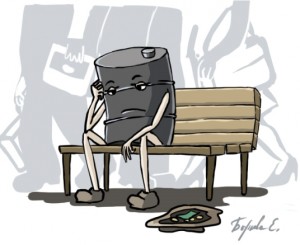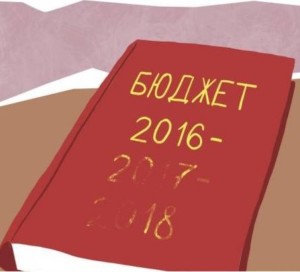
Russia has entered the new year 2016 with a federal budget based on an oil price of $50 per barrel. Compared to previous years, almost all expenditures have been cut down except for those of armed forces, police, riot police OMON and the like. In the previous years projected oil price used to be considerably higher and reached $85 a barrel or even more. However, the wheel of hydrocarbon fortune has turned, and since summer 2014, world oil prices have been consistently falling and, as of the end of 2015, have dropped lower than $40 a barrel. However, neither the Russian government responsible for drafting the budget nor State Duma members seem bothered about the $50 per barrel budget forecast. Indeed, why get upset before the holidays? What if after a long vacation, which in Russia, in 2016, will last from January 1 up to January 10, oil price suddenly skyrocketed?
Russia’s federal budget revenues from hydrocarbon exports amount to 44 percent. Consequently, if 2016 world oil prices fluctuate around $40 per barrel, the federal budget will fall short more than 10 percent of projected revenue in dollar terms. Although the expected strengthening of dollar against other major currencies including the ruble will obviously partly make up for budget losses in 2016, the Russian population will nevertheless feel poorer because the share of imported goods in the consumer basket remains high. For instance, 70 percent of all drugs in Russia are either imported or manufactured using foreign materials purchased with US dollars. In this context, the country will be lucky if the projected 2016 inflation of 6.4 percent turns out to be only twice as high, as it happened in 2015. According to the Russian Federal State Statistics Service (Rosstat), as of the end of 2015, the inflation reached almost 13 percent compared with the projected 5.5 percent in the 2015 federal budget.
According to Russian Finance Minister Siluanov, the Reserve Fund will be used to cover the budget deficit as a result of which the fund will shrink by more than 60 percent to 1.62 trillion rubles. Moreover, Siluanov said that Russia’s Reserve Fund will not be replenished this year.
According to experts, based on the current global market conditions, it is highly unlikely that oil price will return to its peak height of previous years when it reached $100 per barrel and more any time soon.
Therefore, Russia’s unbudgeted losses due to the difference between the projected and the actual oil price could result in the Russian authorities having to procure 2 trillion rubles if oil prices remain under $40 per barrel. The Reserve Fund will not be able to cover this difference.
Given the continuing decline of industrial production in the country, the lack of Western financing due to sanctions and the necessity to pay off the previously accumulated debts of state-owned corporations, the Russian budget will quickly run out of money even if the government does not boost military spending.

It is yet unclear how and when all this federal budget craziness will come to an end. Russian lawmakers apparently do not care whether the 2016 federal budget is implemented or remains an insignificant piece of paper that they all voted for just to check the box. It is also obvious that the federal budget deficit will not directly affect the wellbeing of State Duma members, senators and their families because they are all rather wealthy people who are constantly concerned about securing their income, benefits, health care, leisure-time activities and healthy diet. However, one cannot ignore the inexorable laws of economics no matter how much one might want to. Budget deficits speed up inflation and lead to the impoverishment of the population. In the current historical moment, the enduring and forbearing Russian people is very enthusiastic about seeking out and attacking foreign enemies. The list of those who prevent the descendants of the Russian Empire from getting up off their knees includes, but is not limited to, Georgians, Estonians, Turks and the damned Americans behind them.
A century ago, a similarly aggressive foreign policy of the Russian monarchy resulted in the collapse of the country’s economy and led to a revolution.





